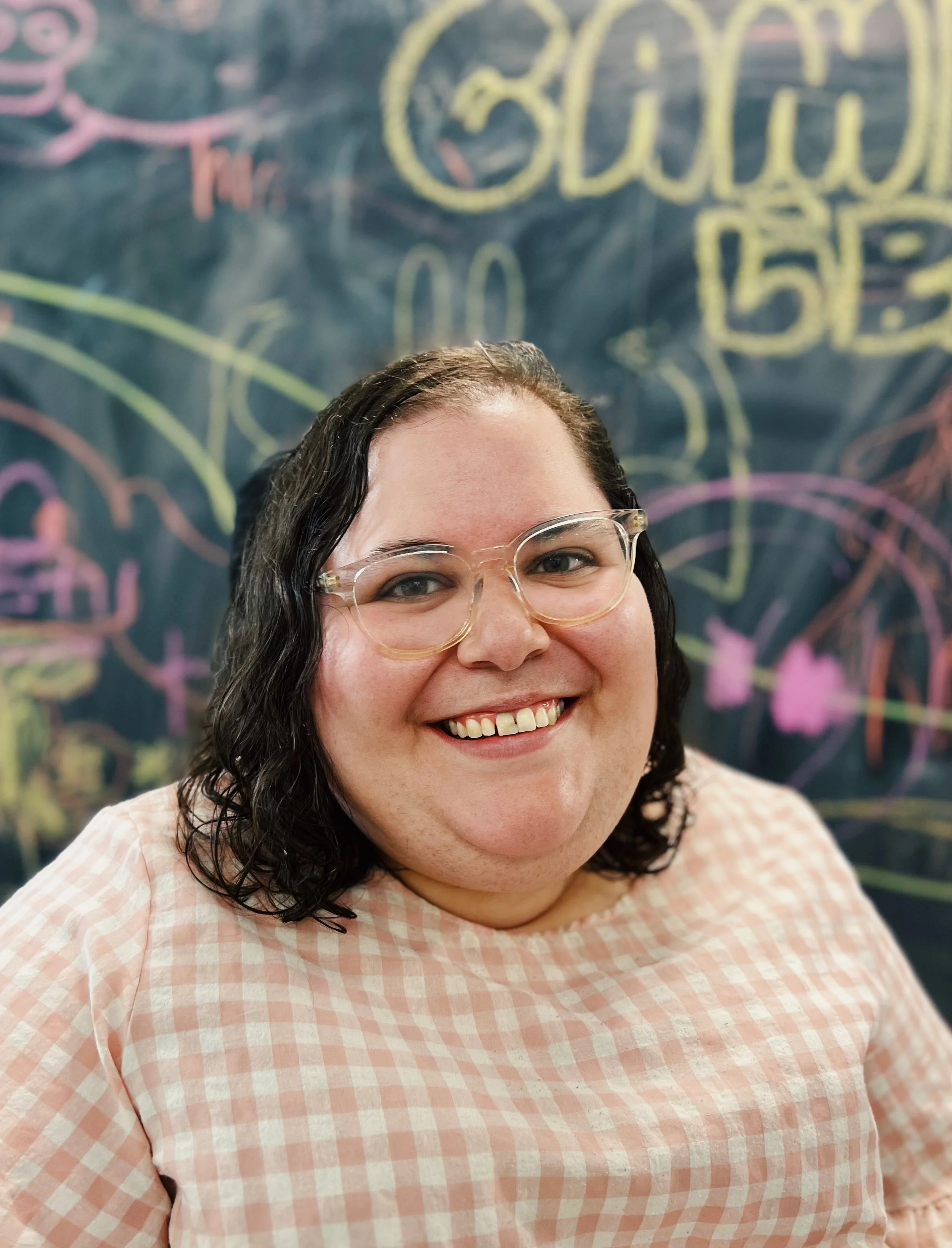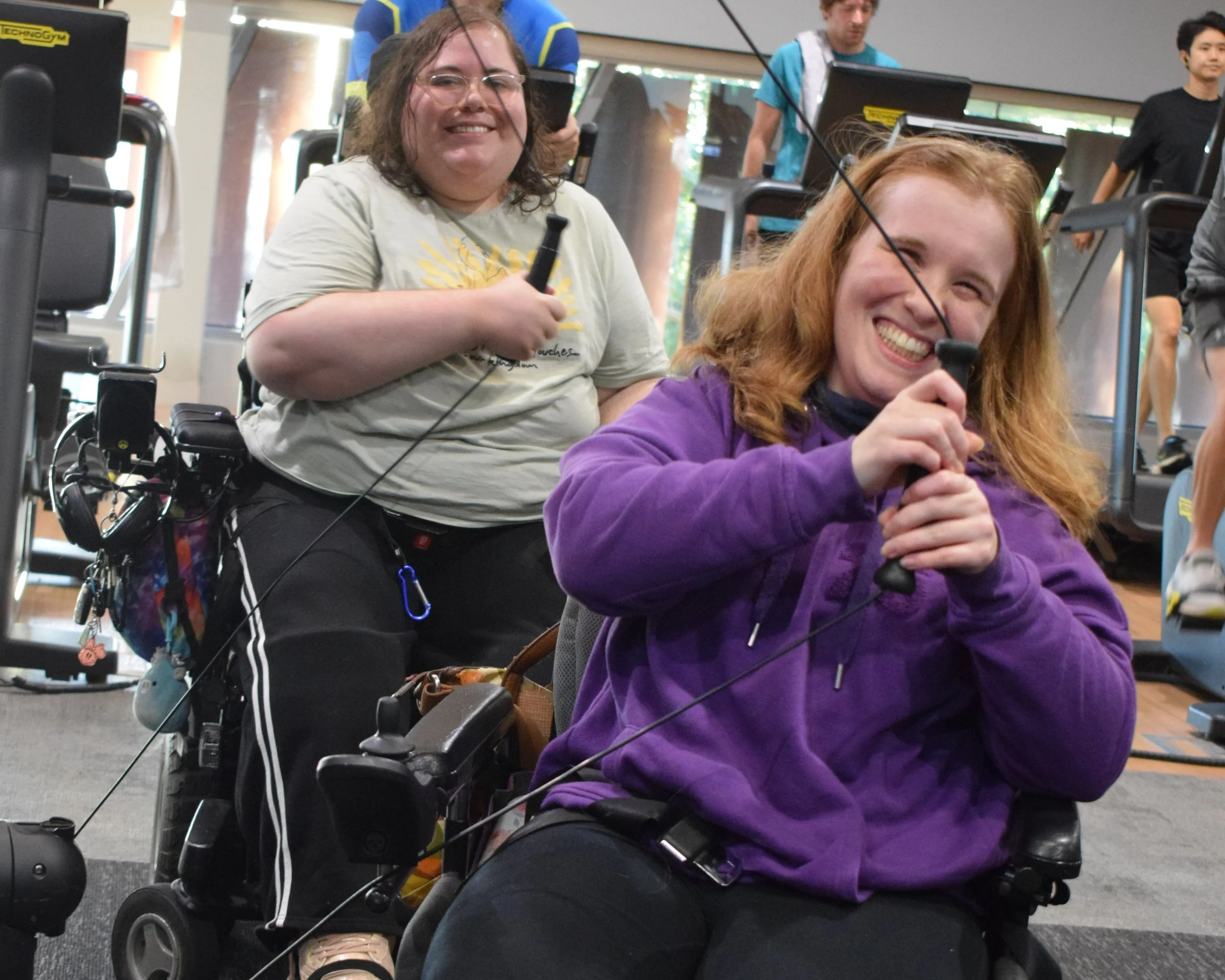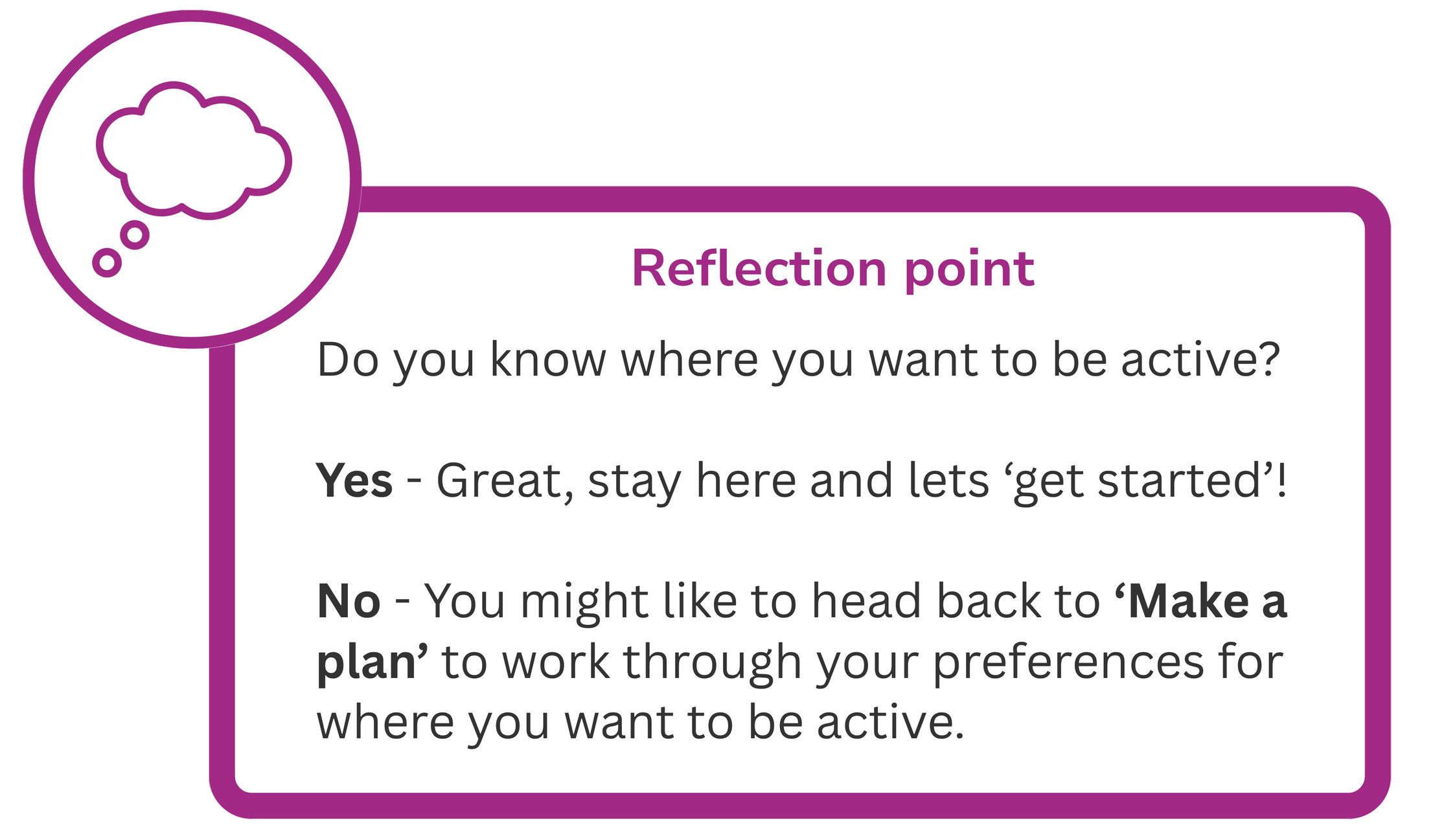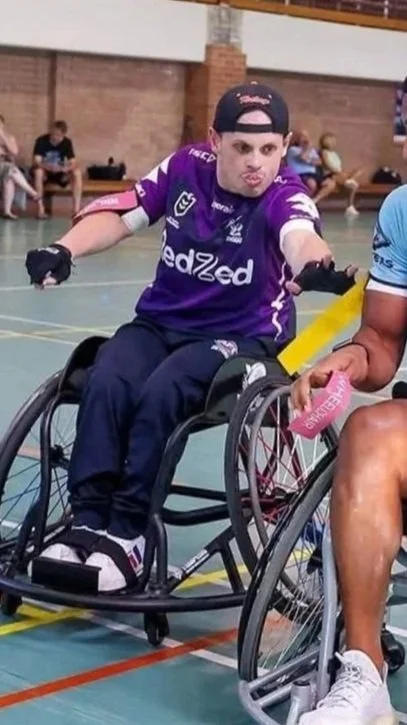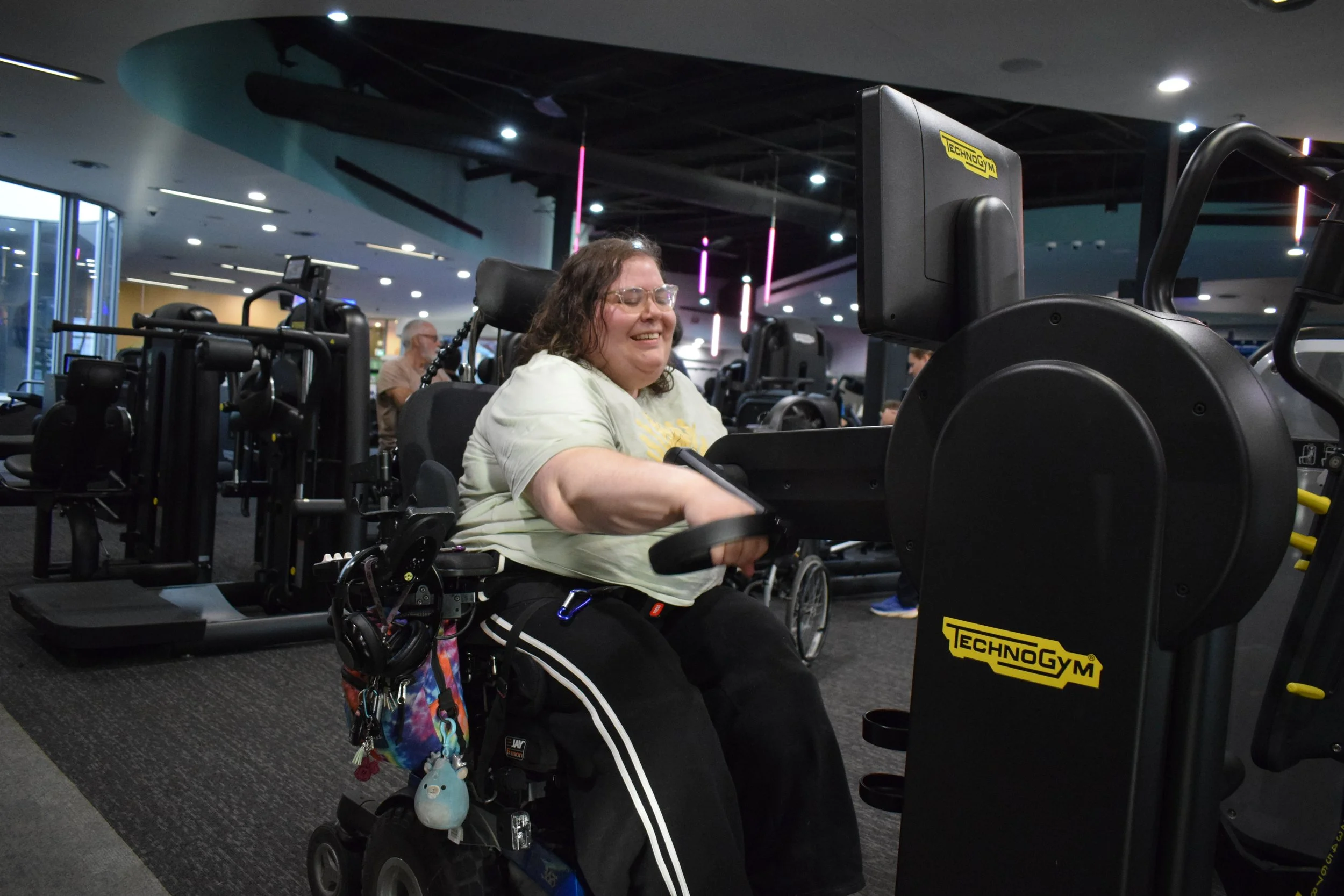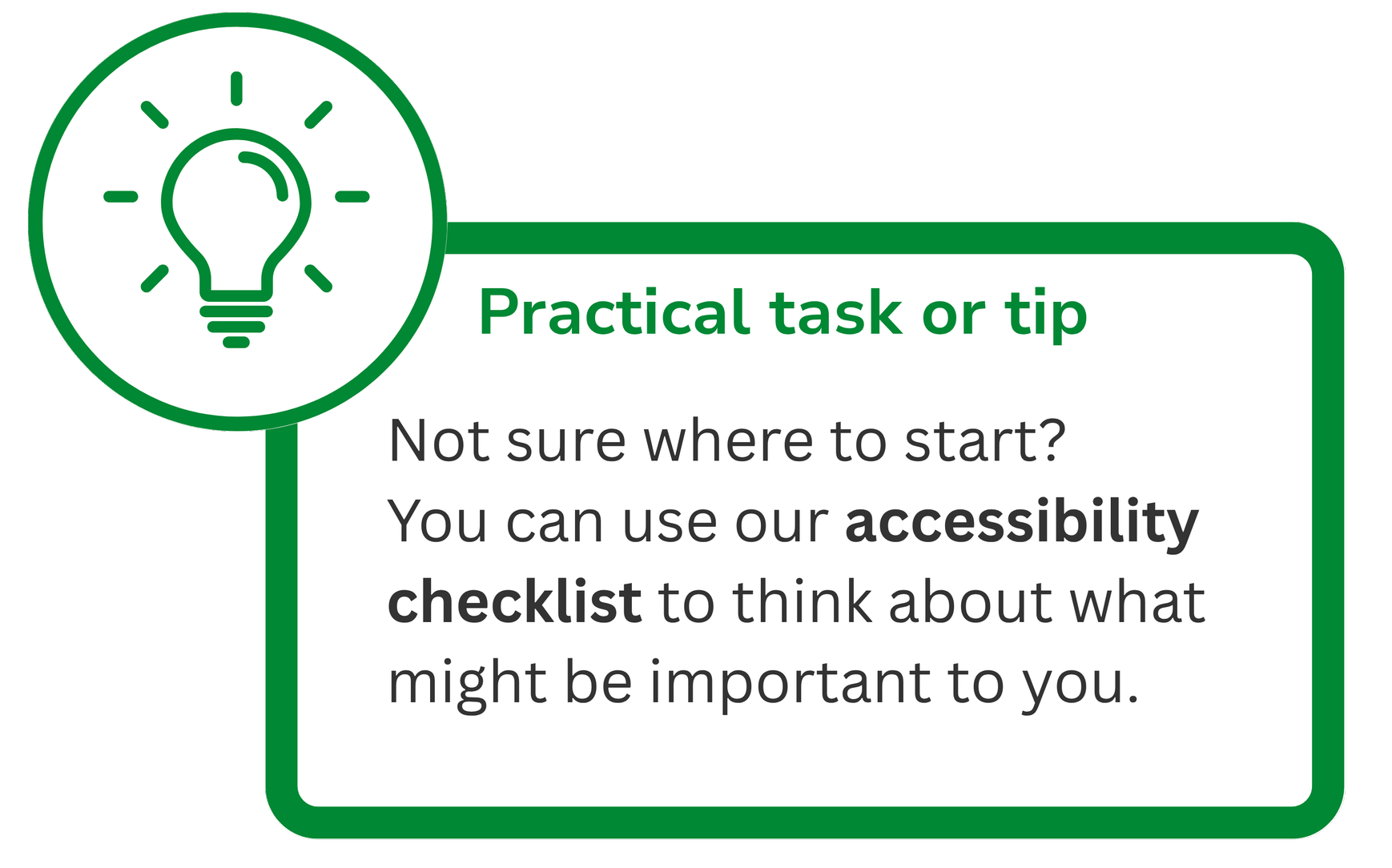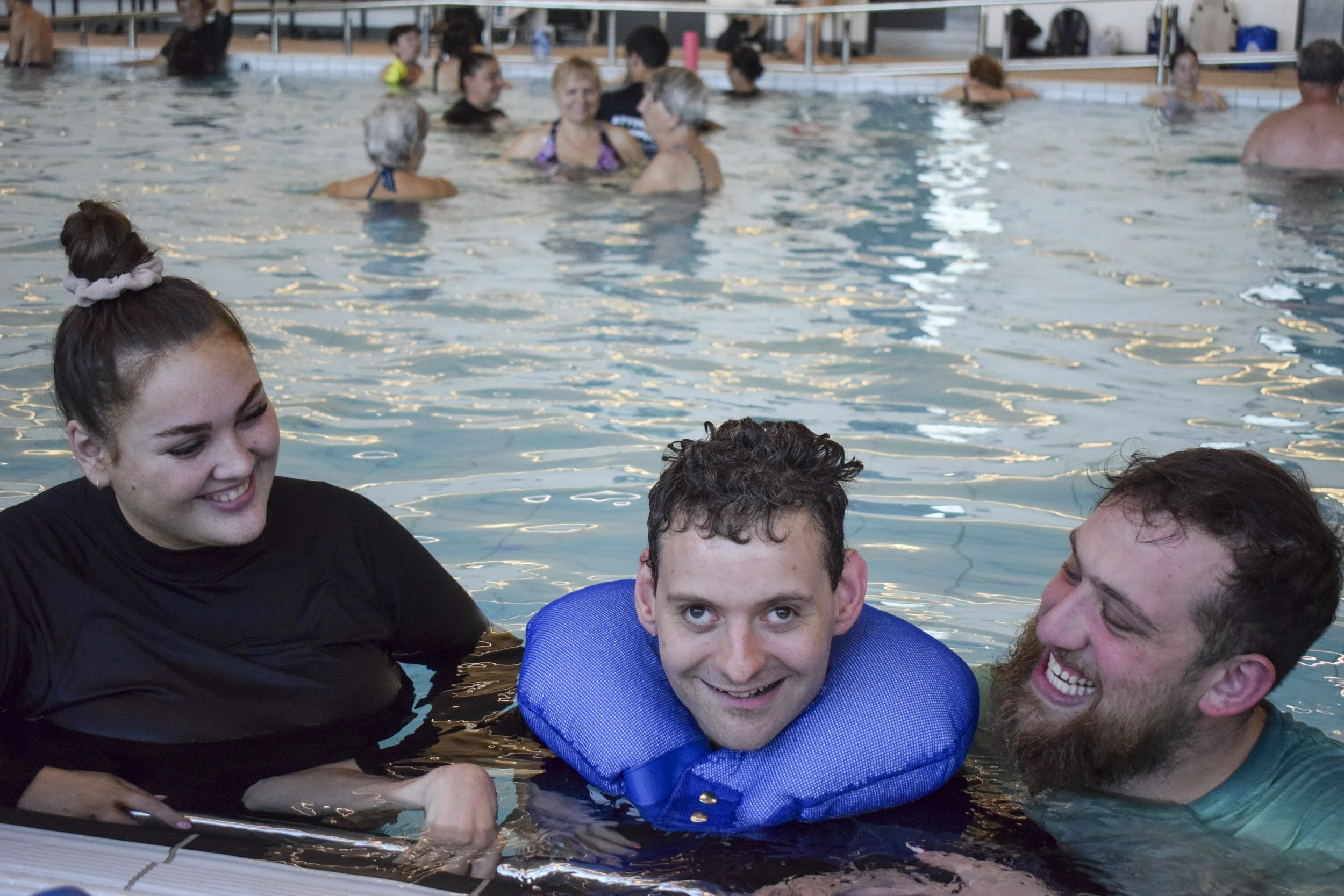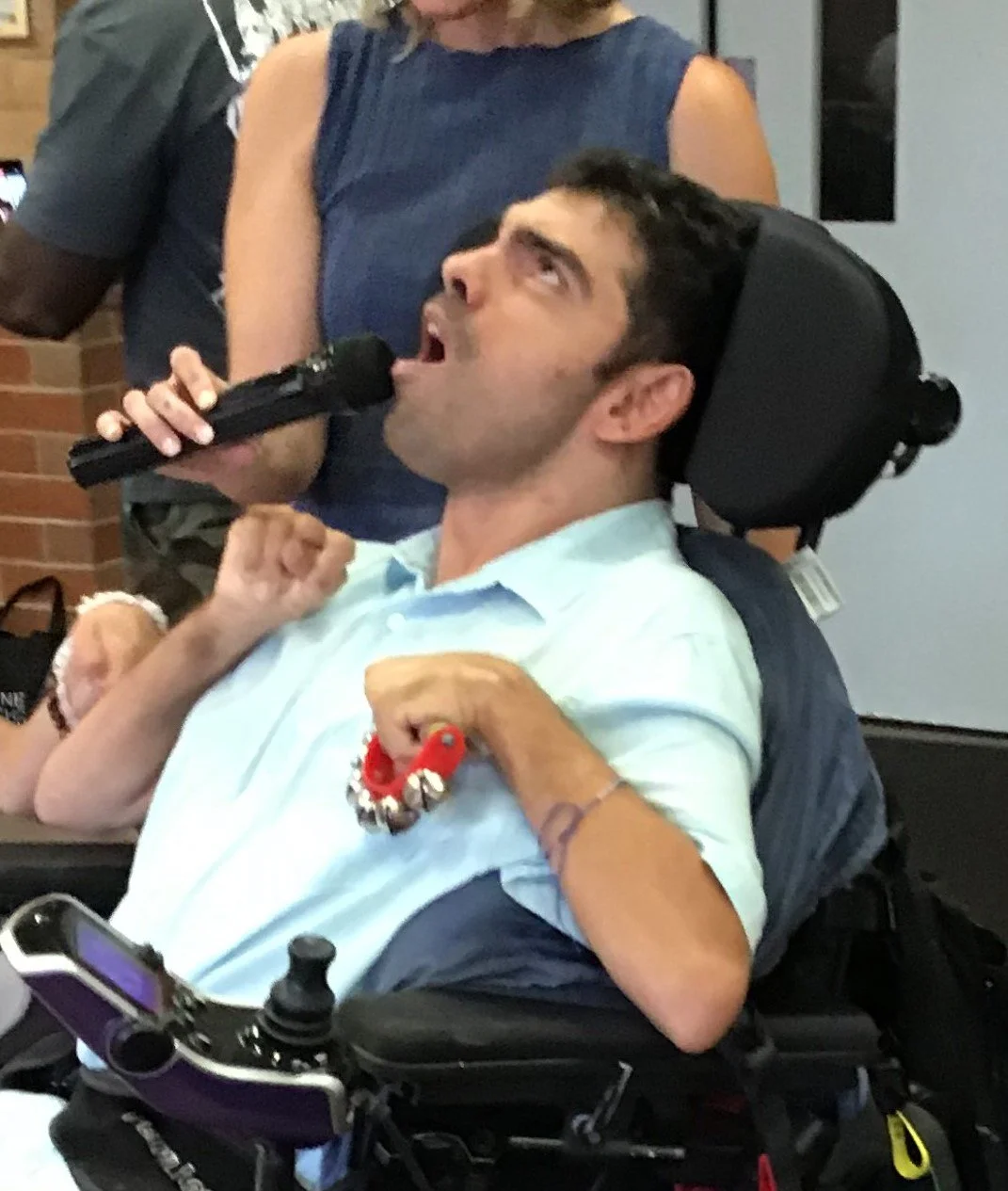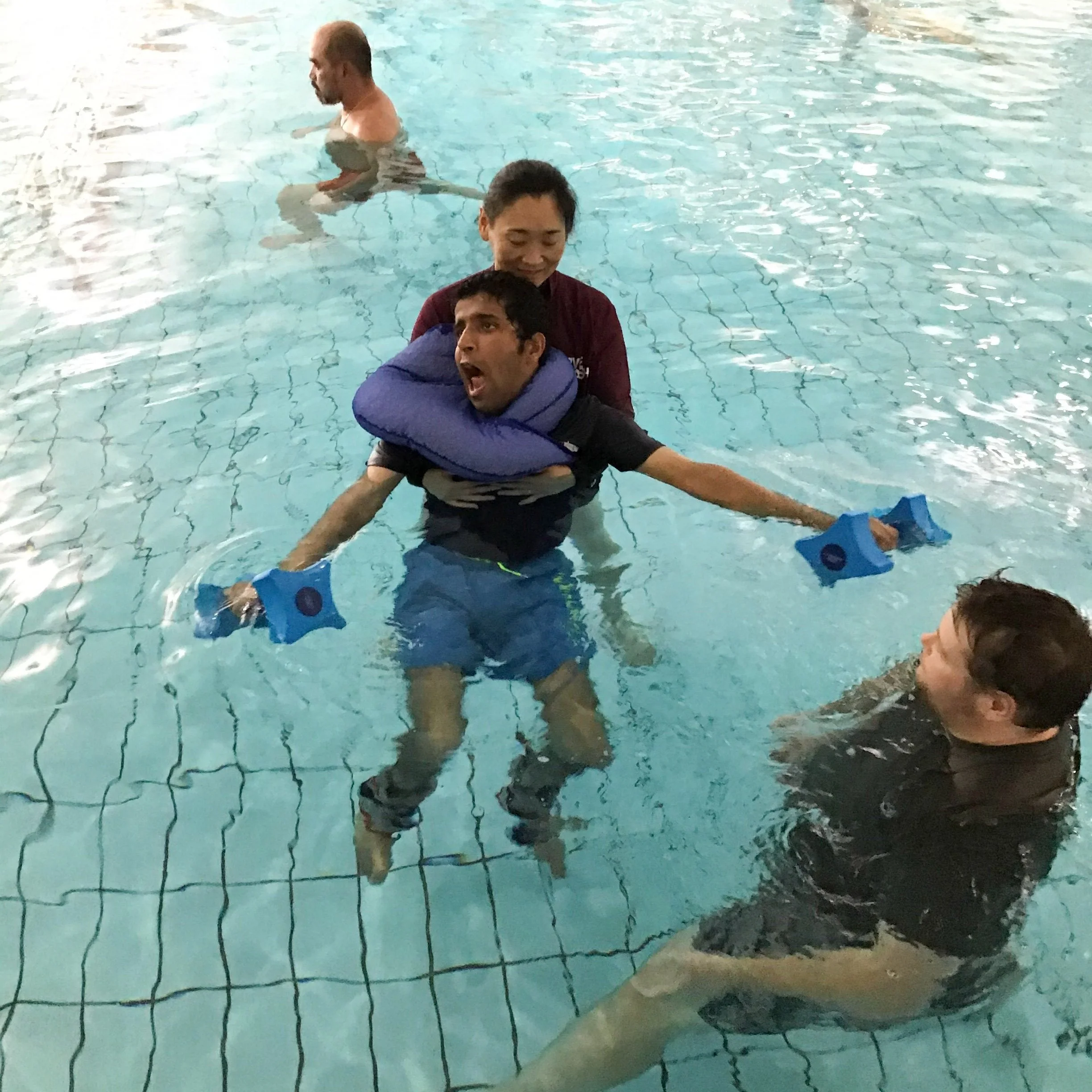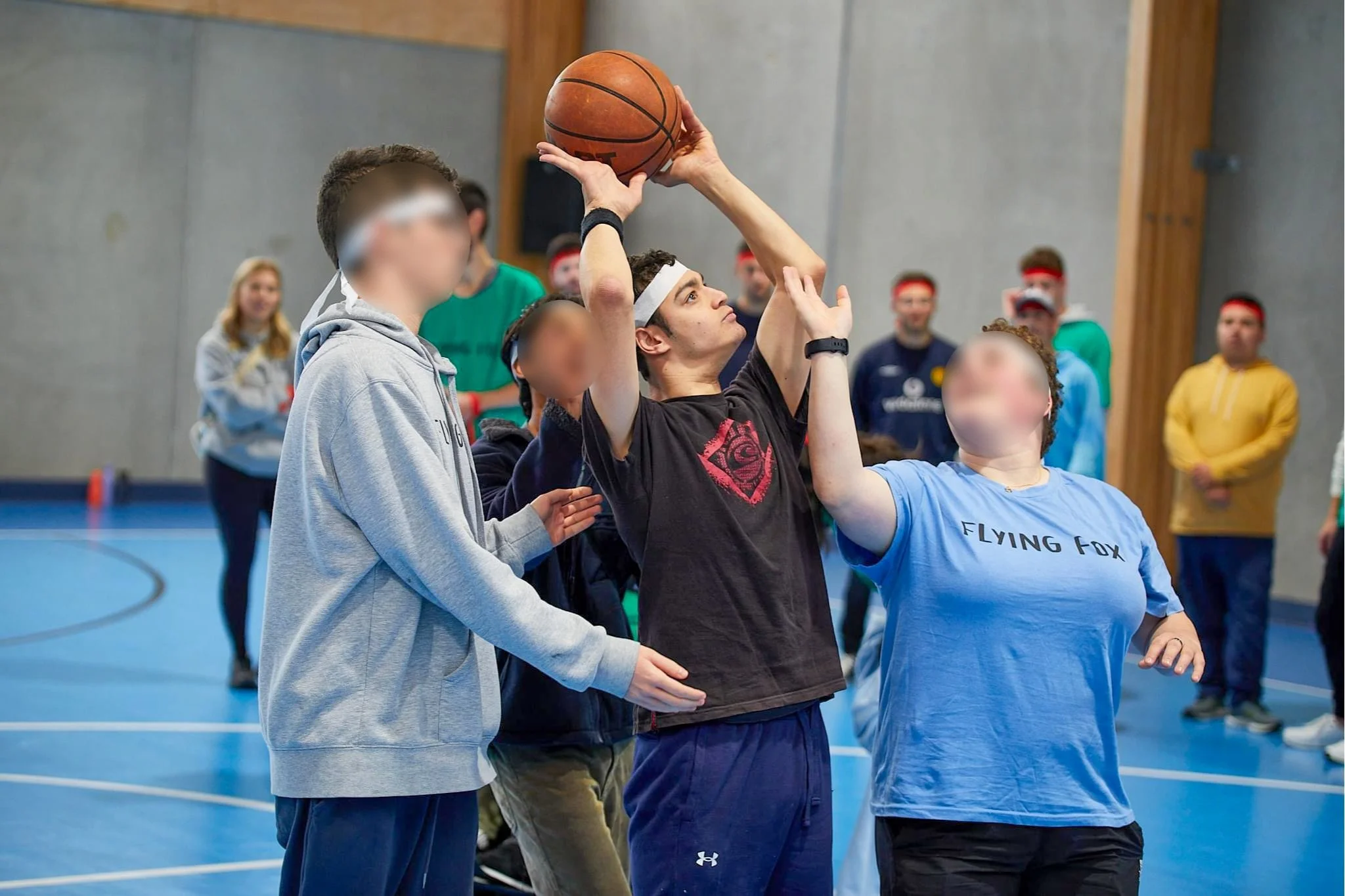
Get ready
Getting ready and finding a good fit for you will depend on your individual needs, but might include things like location, accessibility, support needs, and friendliness of the environment!
Do or delegate?
“To paraphrase someone smart, ‘a good leader delegates.’
I now realise that delegating doesn’t mean you’re giving up your autonomy. It helps you get things done.”
- James P
Sometimes getting active is straightforward, other times there might be a lot of moving parts to organise, especially at the beginning.
There might be tasks that you could delegate to save time, energy, allows you to focus your energy on what’s most important to you.
As you go through this page, think about what tasks might be required, and which ones you want to do, or which you might want to delegate.
Either way - you’re in control.

Finding the right place
When getting active in the community, there might be specific accessibility needs to consider.
Accessibility needs will differ from person to person but might be to do with
Physical accessibility
Does the place meet your physical needs?
Communication accessibility
Are you able to communicate effectively in the place?
Sensory accessibility
Does the place meet your sensory needs?
Attitudinal accessibility
Do the staff and patron attitudes make you feel comfortable in the place?
Program accessibility
Are there the supports you need to access the programs you want?
How do I find out about accessibility?
-
Asking someone else with disability who has been there can be a really useful way to find out about what the venue is like
-
These days, more and more venues have some accessibility information on their web page. This might be written information, photos, or a downloadable Access Guide
Access guides usually have written and visual information to help users understand what the physical and sensory environment is like and what to expect when you go to the venue. They can help plan for the visit. Examples of access guides can be found on the resource page
-
Because access needs are often unique to each person, contacting the venue directly to ask about your access needs.
You might like to ask about things like
if there are quieter times to go
the knowledge of staff about equipment and accessibility
the process for coming to visit the place
do they have any disability inclusion programs or initiatives
To help you think about what access needs might be important to you, our team has developed an access checklist.
You can use the checklist to better understand what access needs might be most important for you, and to support conversations with the venue.
-
Looking at a space can be done by you, or can be done by a trusted person who understands your access needs, like a family member or therapist.
Before starting an activity, many adults with cerebral palsy still want to go to the place themselves, to meet the people, see the space, and see if they feel comfortable.
Do or delegate?
Michaela asked her physio to go out to the gym first, to check the physical access of the space and equipment.
Balancing it all
Finding the right place for you might be a tricky balancing act. You will have to consider lots of different things and you might need to look beyond the closest venues to find something that works best for you.
It can be helpful to think about what you can compromise on and what you can't. Writing a pros and cons list might also help you figure this out.
“I don’t want to be somewhere that doesn’t want me there. I don’t mind leading a horse to water if they'll drink.”
- James P
“It’s always very telling about how inclusive a place is by how they respond to an inquiry.”
- James D
“Don’t write off an idea straight away. If you’re interested in a particular activity, have the discussion ‘could this be adapted for me?’.
If you want it, advocate for yourself or ask people to advocate for you.”
- Freya
“For us, we had to find a day that worked for multiple people and ensure that the pool had the right facilities, the hoist access and chairs, changing facilities. And the staff - were they familiar with cerebral palsy?
Our current pool made it very very easy. If there was a facility that weren’t as keen to meet us halfway to organise it, it would have been much much more difficult for us.”
- Nick’s carer
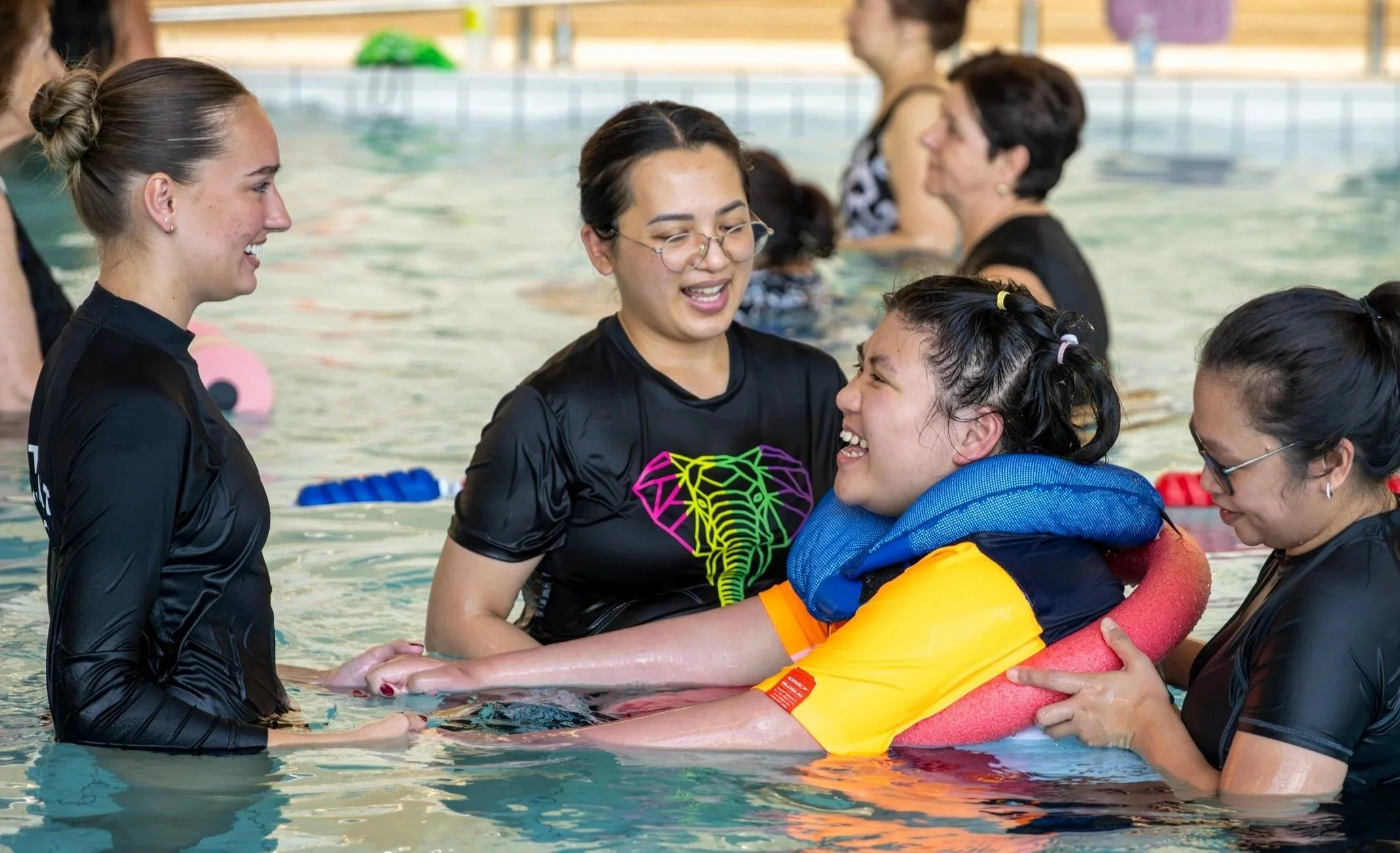
Finding the right people
“One of the things that really helped me get started was a support network of people around me.”
- James
After working through ‘Making the Plan’ you may have some idea of who you want involved in and supporting you in your physical activity.
In this section, we will talk mainly about finding paid supports because they are usually the ones that young adults often have difficulty finding.
Two common paid supports for physical activity are
Support workers/paid carers
Specialists
Support workers
Support workers are commonly employed to support a person’s participation, and can provide useful assistance for those doing community physical activity.
Around the world support workers might also be called personal care assistants, carers, personal support services.
Not everyone will want or need a support worker.
You might use a support worker for some physical activities and not others.
Support workers: Tasks and preferences
Adults with cerebral palsy often find it a challenge to find the ‘right’ support people.
So what makes a suitable support worker for physical activity?
This will depend on what tasks would you like them to support you with as well as your preferences.
Some tasks to think about for physical activity might be
Transport
Planning or following a schedule
Personal needs
Going through an exercise program
Supporting your communication
Setting up equipment
Motivating or encouraging
Helping you feel comfortable in the place
I'm looking for 'a taskmaster' I want some reasonable competitiveness
- James P
You might also have preferences about the person supporting you. Our team has suggested some preferences they thing about when getting active, what do you think is important to you?
similar interests
similar age or gender
encouraging or motivating
disability or physical activity experience
Being clear about the tasks you need and your preferences during the interview process can help to make sure everyone is on the same page about what you are looking for in a support worker.
Finding a support worker for physical activity
Finding a support worker might depend on where you live and the funding available to you.
You might like to try
Agencies
Ask your friends, family or online community for recommendations
Asking your support coordinator to make a list
Ask your therapy team if they can recommend anyone
“I usually find my support worker through an agency. It involves a zoom interview with the person who would be given a shadow shift with my mum. It would take about 1 month to find a support worker.”
- Lisa
Specialist support
You might like or need to have some specialist input for your physical activity.
For adults with cerebral palsy, this most often comes from physiotherapists and exercise physiologists.
All physiotherapists and exercise physiologists will have specialist knowledge in exercise programs.
Knowledge about cerebral palsy will depend on their experience and further training.
Safety First
Not all exercise will be safe for all people. Sometimes it will be important to get advice or support from a health professional before starting a new exercise routine or activity.
A physiotherapist, exercise physiologist, or doctor can give you personalised advice on how to exercise safely and help you create a good plan for starting something new. You should consider getting professional guidance if you have medical conditions.
Remember: Getting professional advice doesn't mean you can't be active - it means finding the right activities and approaches that work safely for your individual situation. Your health team can help you find ways to be active that are both safe and enjoyable.
Specialist support: tasks and preferences
Some of the tasks that adults with cerebral palsy often get specialist input for are
designing the exercise program
training you or your support workers to work independently
modifying the programs
being the person that you exercise with
The way specialists work with you might also be very important.
As an adult, our team felt that there were some important attributes that made the ‘right’ specialists;
Being collaborative to work on what you want to get out of physical activity
Open and responsive to your suggestions and feedback
Willingness to learn from you
“Flexible thinkers”
Problem solvers
Support for some trial and error
Support some risk taking
For Michael, being active in his dance group is about social activity with movement and singing. He did not feel he needed specialist support for this.
For Yatish, it is important to have a physio make the pool exercise program, advise on safety equipment, and to train him and his support workers, so that he feels safe.
Finding a specialist support
Recommendations
From other therapists in your team
Family and friends
Support coordinators
Professional search engines
Many health professional associations have search engines to look for specialists in that field:
Physiotherapy
The Australian Physiotherapy Association (APA) has a ‘find a physio’ search engine.
Filtering for physiotherapists with ‘disability’, ‘neurology’ or ‘paediatric’ experience might help to refine your search.
Exercise physiology
Exercise and Sport Science Australia (ESSA) has a ‘find an accredited exercise professional’ search engine.

